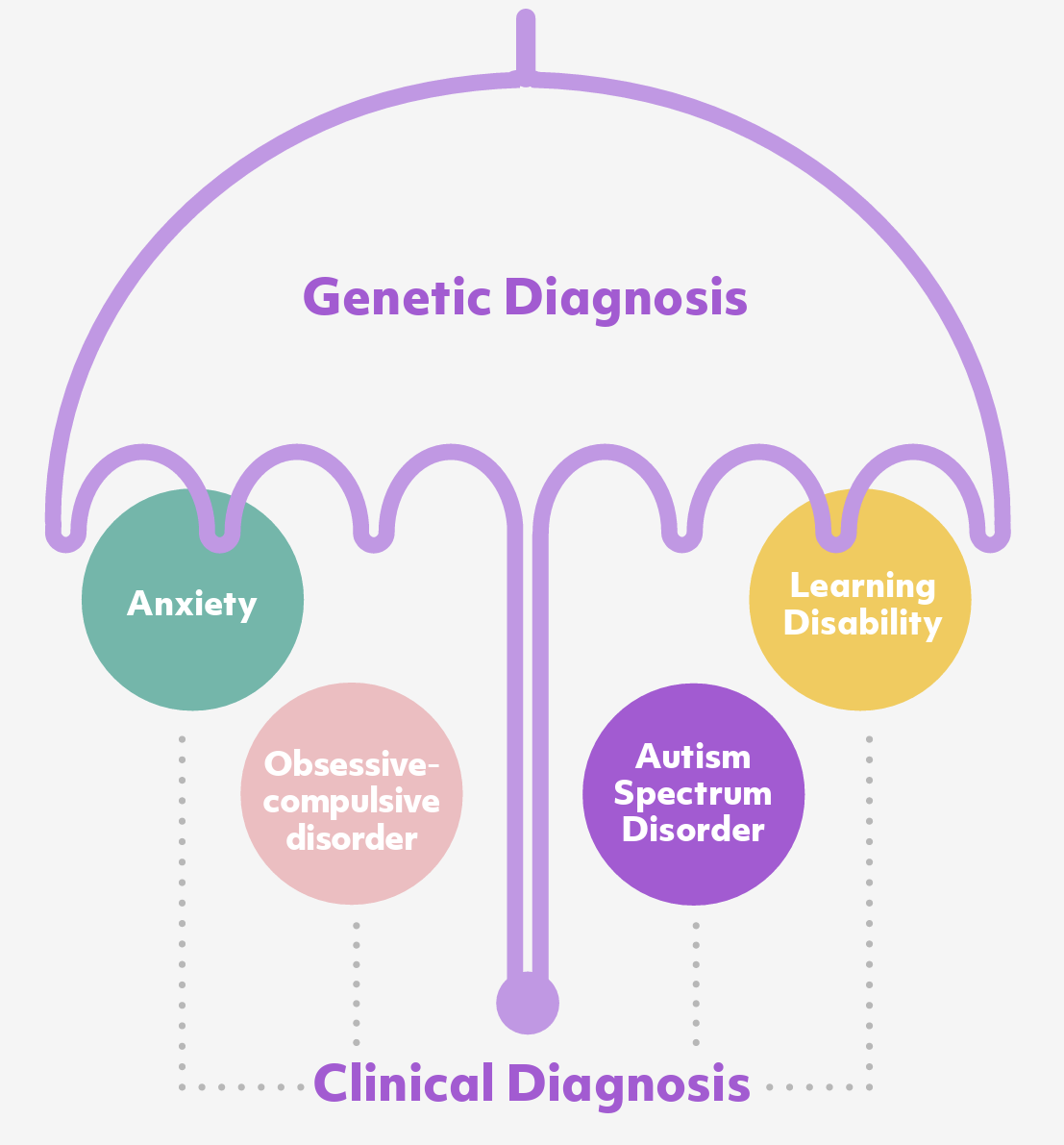A Family Guide: Understanding Genetic and Clinical Diagnoses
Written for Families by the Simons Searchlight Genetic Counselors
Misia Kowanda, Emily Palen, Elisheva Dubin, and Jamie Lundy
Introduction: Why Diagnoses Matter
When your child receives a diagnosis, whether it’s a developmental delay, autism, epilepsy, or a rare genetic condition, it’s natural to have questions. Families often ask questions like:
- Is my child’s medical issue caused by their genetic variant?
- If my child has a genetic condition, does that explain everything about their health?
- Why do symptoms vary so much, even among people with the same genetic diagnosis?
- Does my child still “have” autism if a genetic condition caused it?
This guide will help describe the difference between a genetic diagnosis and a clinical diagnosis, how they are used together, and what that means for you or your child.
What is a Genetic Diagnosis?
A genetic diagnosis is the result of genetic testing, which seeks to find the cause for a condition. This can help to guide treatment, inform what to expect as someone grows, and give families helpful information for future planning.
- Genetic diagnosis: Identifying a specific gene or genetic variant(s) that cause a disorder.
What is a Clinical Diagnosis?
A clinical diagnosis comes from doctors who use certain rules or guidelines to decide if someone has a condition. For example, a child may be diagnosed with global developmental delay if they are far behind in at least two areas of growth, like learning to speak and learning to move.
- Clinical diagnosis: The diagnosis that a medical professional makes based on a person’s symptoms, medical history, and physical exam.
Genetic vs Clinical Diagnosis
Genetic conditions are sometimes associated with specific medical features. A genetic diagnosis can be thought of as an umbrella that covers several possible clinical diagnoses. Receiving a genetic diagnosis identifies an underlying genetic cause that may lead to a variety of clinical diagnoses.
Once a person has a genetic diagnosis, their doctor may suggest additional clinical evaluations based on what is previously known about the genetic condition. After these evaluations, their doctor may confirm if a person has or does not have associated clinical diagnoses.

Key Differences Between Genetic and Clinical Diagnoses
How are the diagnoses made?
Genetic diagnoses involve laboratory analysis of genes or chromosomes and interpretation by genetics professionals, such as a medical geneticist, genetic counselor, or neurologist.
Clinical diagnoses rely on observations in the medical clinic and in-person assessments. Clinical diagnoses are made by a qualified medical professional, such as a medical doctor, developmental pediatrician, neurologist, psychologist, or psychiatrist.
Are all genetic findings a genetic diagnosis?
Not all genetic variants identified through genetic testing will result in a genetic diagnosis. A genetic diagnosis will depend on the type of genetic condition and what is known about the gene or gene variant. For example, some genetic conditions need two damaging genetic variants for a person to develop the genetic condition.
Is a variant of uncertain significance a genetic diagnosis?
A variant of uncertain significance (VUS) result is not a genetic diagnosis. More information is needed to determine whether it is a problematic variant (pathogenic or likely pathogenic), or a harmless variant (benign or likely benign).
When you receive a VUS result in the clinic, your provider might need more medical history information or ask for genetic testing of family members to understand if the variant causes a genetic condition. But, even with additional information, sometimes a VUS result might not be reclassified at the time. More research and/or genetic testing of people with that genetic condition is needed to understand which variants cause a particular genetic condition, or not.
How accurate are genetic or clinical diagnoses?
The genetic diagnosis provides the genetic cause of a person’s medical features. Even with a genetic diagnosis, you or your child may develop some or many of the symptoms associated with that condition. Often, people wonder if all of their medical features are a result of their genetic diagnosis. For more information on this, see the next section below.
Receiving a genetic diagnosis does not automatically result in related clinical diagnoses. For example, receiving a diagnosis of a neurodevelopmental genetic condition does not mean that the person automatically receives a diagnosis of autism, or other clinical diagnoses.
A clinical diagnosis may sometimes be up for interpretation by the doctor’s evaluation of a set of symptoms.
Once I get a diagnosis, what should I do with this information?
A genetic diagnosis provides additional information, such as other medical evaluations needed, and may be used for family planning decisions. Also, after you or your child receives a diagnosis, you may want to connect with others who have the same genetic condition.
Clinical diagnoses help to guide the therapies and interventions that a person needs, including the need for genetic testing.
The combination of genetic and clinical diagnoses can be helpful for clinical trial participation.
How does getting a diagnosis help me or my child?
A clinical diagnosis can provide a general understanding of the symptoms of a disorder and how it should be managed, whereas a genetic diagnosis might provide more specific information about the disorder and its progression.
Genetic Variation and Its Link to Clinical Outcomes
 New genetic variation occurs in every single human
New genetic variation occurs in every single human
- You have genetic variants that are different from your parents.
- With each pregnancy, there are new genetic variations within the sperm and egg, and as a result, we are all a little bit different from each other. This is not caused by anything either parent has done –– it’s no one’s fault.
- Most genetic variants that occur do not cause any developmental or genetic conditions, but damaging genetic variants can be a major contributor to medical conditions.
- Our genes don’t work in isolation –– things like a person’s environment, as well as their other genes, can influence how a variant will affect them.
- That’s why people with the same rare genetic condition may develop in different ways.
You are a result of the contribution of all your genes and gene variants
- This means that people with the same genetic condition, even the same genetic variant, often do not have the exact same medical features. This is also true among family members.
- You may see a list of clinical issues that are known to occur for people with your family’s genetic condition, but this list may or may not represent you or your child.
- This is to be expected because of the genetic differences between every person, even close relatives.
What medical features come from your genetic variant?
- Often people ask, “Are all or many of the developmental differences in my child the result of their genetic condition?” This is difficult to determine, and no one can definitely say that all unique medical issues a person has are a result of a particular genetic variant.
- Over time, with enough people participating in research, the scientific community can describe the common medical features associated with a genetic condition.
- Thus, there is a link between certain medical issues and a specific genetic variant, but not everyone with the variant will have all the features described, or a person may have other features that have not been described in the research.
What's Next? Finding Support and Moving Forward
Receiving a genetic or clinical diagnosis, or both, can bring clarity, but it can also lead to more questions. That’s okay. Understanding how these diagnoses work together is an important step in navigating your child’s care and advocating for their future.
You don’t have to figure it all out alone, which is why we created this resource for you and your family. There are many ways to learn more, get connected, and help move research forward.
Explore More Resources
- Simons Searchlight genetic condition pages: Find summaries, guides, and data specific to your child’s genetic condition.
- Genetic counselors: Ask your doctor for a referral if you want help understanding test results or family planning options.
- Clinical care teams: Use your child’s clinical diagnosis to access therapies, early interventions, or school-based support.
- Support communities: Connect with other families through patient advocacy groups and condition-specific networks.
- Educational materials: Check out trusted sources like MedlinePlus Genetics, or SPARK for Autism.
Contribute to Research
If your family participates in Simons Searchlight or another study, your data helps researchers:
- Discover which medical features are linked to specific genes
- Understand how symptoms vary
- Improve future diagnosis and care for others
Your participation matters – it pushes science forward and helps families everywhere.
You’re Not Alone
Whether you’re new to this journey or further along, your questions are valid and your voice matters. Understanding the difference between genetic and clinical diagnoses can empower you to advocate for your child, connect with others, and make informed decisions.
Simons Searchlight is here to support you every step of the way.
Glossary
- Genes: Genes are made up of a molecule called DNA. Humans have thousands of genes. Genes carry the instructions for making proteins, which play an important role in the development of and functions of the body.
- Chromosomes: The DNA of a cell is packaged into structures called chromosomes. All human cells, except for sperm and eggs, contain 46 chromosomes.
- Gene variant or genetic variant: A gene variant or genetic variant refers to any change that is identified in the DNA. Most gene variants or genetic variants do not cause any developmental or genetic condition. A gene variant or genetic variant must be interpreted by a genetic counselor to determine if the variant is linked to a genetic condition or not.
References & Further Reading
- MDA Quest: What’s the Difference Between a Clinical and Genetic Diagnosis? – https://mdaquest.org/whats-the-difference-between-a-clinical-and-genetic-diagnosis/
- MedlinePlus Genetics:
- Genetic Testing Overview:https://medlineplus.gov/genetics/understanding/testing/genetictesting/
- Diagnostic Versus Screening Tests: https://medlineplus.gov/genetics/understanding/testing/uses/
- National Institute of Mental Health (NIMH): Autism Spectrum Disorder – https://www.nimh.nih.gov/health/topics/autism-spectrum-disorders-asd
- Autism Speaks: Autism Spectrum Disorder Overview – https://www.autismspeaks.org/what-autism
- International League Against Epilepsy (ILAE): A Practical Clinical Definition of Epilepsy – https://www.ilae.org/guidelines/definition-of-epilepsy
- SPARK for Autism: Diagnosing Autism Resources – https://sparkforautism.org/discover/tags/diagnosing-autism/






